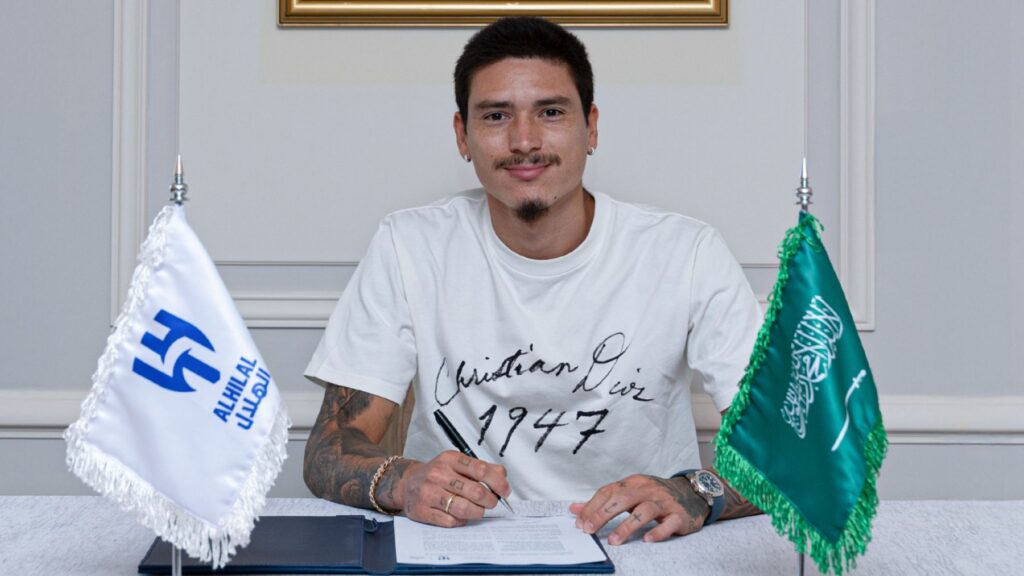
With the signing of Darwin Núñez to the club Al Hilal From Saudi Arabia, one more star from South America goes to the Arabian Peninsula. Surely within the club many sports reasons were found to sign, but for those who make the decision to open the box for these investments from the Saudi state, there are other important factors also to authorize it.
Uruguay, the country of Darwin Núñez, It is one of the countries identified by the Saudis for a few years within their international strategy, but especially in the aspect of its food security. Also for neighboring countries such as Qatar and United Arab Emirates, Uruguay and South America in general is a key region in sectors such as food, transport and energy. A little known fact is that South America houses the greatest Arab diaspora outside the Arab world.
Arabia faces a persistent challenge: only 1% of its land is cultivable. Countries such as Qatar, Emirates and Saudi Arabia are located in an extremely arid region and, therefore, depend largely on food imports. Under the saying “we can choose our friends, but not our neighbors,” the Saudi Royal House is surrounded by countries in conflict and with a neighbor in the north, Iran, who is his main rival for hegemony in the region.
For political and security reasons, the type of business it does in South America for its food security cannot be done there. Qatar lived first hand during the boycott and blocking of its borders in 2017 by neighboring countries, which caused serious problems to import food. The boycott caused serious problems to meet the food needs in the country and the sheikhs had a food security plan, such as Eau's strategy.
For example, a few years ago, United Arab Emirates imported 4,500 dairy cows from Uruguay, as part of an initiative to strengthen its food safety. Like EAU and Qatar, which depend on imports for their daily supply, Saudi Arabia seeks to strengthen their food production, especially in agriculture, and diversify their import sources. In this context, countries like Uruguay become strategic to guarantee their food security.
Uruguay, with its solid reputation and its high quality agroindustrial production, appears as one of the most stable and reliable partners for the Gulf. Already in 2010 Uruguay and Saudi Arabia signed a cooperation agreement in this area, focusing on direct agricultural investments.
This plan marked one of the first Saudi approaches to this region in this area. The same year the Saudi company Definiam acquired 12.14 hectares in Argentina with a goal: to produce fodder for animals in the Middle East, without exhausting the water resources of the kingdom. A few years ago, in 2023, the Saudís also announced an investment of 460 million in food and food health in the country of Messi.
Qatar, through its investment fund, has 25% in property to Adecoagro, Company with agricultural land and operations in Uruguay. This company produces sugar, coffee, corn, rice, milk and biofuels, increasingly attractive products for sovereign gulf funds. Uruguayan companies also exported 4,500 dairy cows during the pandemic to Arab Emirates.
Saudi Arabia enabled meat to its market from Uruguay for years. The Saudi royal house wants to convert the country into the world number one at the level of food security. While aviation and tourism are the other routes of influence for the Saudis in Uruguay. Especially, to participate in the development of aeronautical infrastructure in South America.
In January of this year, Uruguay officially announced the creation of SUA (Uruguayan Aviation Society), a new national flag airline based on Montevideo but financed by Saudi capital. Investing in a national airline in South America allows Saudi Arabia to establish a logistics and commercial node in this part of the world, where, until recently, it has had a limited presence.
Under this project six Airbus A220 aircraft will operate and a Regional Airbus A220 maintenance center is established in Montevideo. This investment is not only in air transport, it also reinforces logistics for perishable food export (such as meat and dairy) from Uruguay to the Gulf.
The famous Saudi Vision 2030which has already been spoken a lot, has all this type of investments as a goal to diversify the Saudi economy, because as they say, “Allah has given us a gift from the sky below the desert (oil).” This resource is finishing little by little. And managers and decision-makers of soccer clubs understand that in order to be “from the desert to sports sky” they will need, among other players top, Align the nationality and profile of a player with other strategic projects of the State, in order to get money to sign them.
Surely during that time many Spanish, Uruguayan or Argentine fans have heard for the first time names of clubs such as Al Hilal de Riad, Saad de Doha or Ain de Abu Dabi, and wonder why these governments had both interest in countries such as Uruguay or Argentina.
For fans who live near the center of Buenos Aires, those who walk daily passing on Bullrich patio or the Isaac Fernández Blanco Hispanic Museum of American Art The answer to their question was even tangible to find in a building in the exclusive neighborhood of Recoleta: the Four Season Hotel in Buenos Aires. It was bought more than a decade ago by an investment group of United Arab Emirates.
Not only did they buy it, they also made a powerful investment to remodel it in 2017. It is not the only iconic hotel in the Argentine land that this property of a country of the Arabian peninsula. In the north of the country, in one of the most beautiful natural parks in the world, the Iguazú National Park, is the Sheraton Cataratas Hotel, which is also on Emirati property.
The tourists who house in this hotel, in the park considered one of the seven wonders of the world, has the throat of the devil, some cataracts with an abyss of more than eighty meters and seven hundred meters wide, an impressive view. Time will say if Darwin has chosen well signing this age for a club in the Gulf, which will take him to the football sky or put him in the throat of the Sports Devil.

